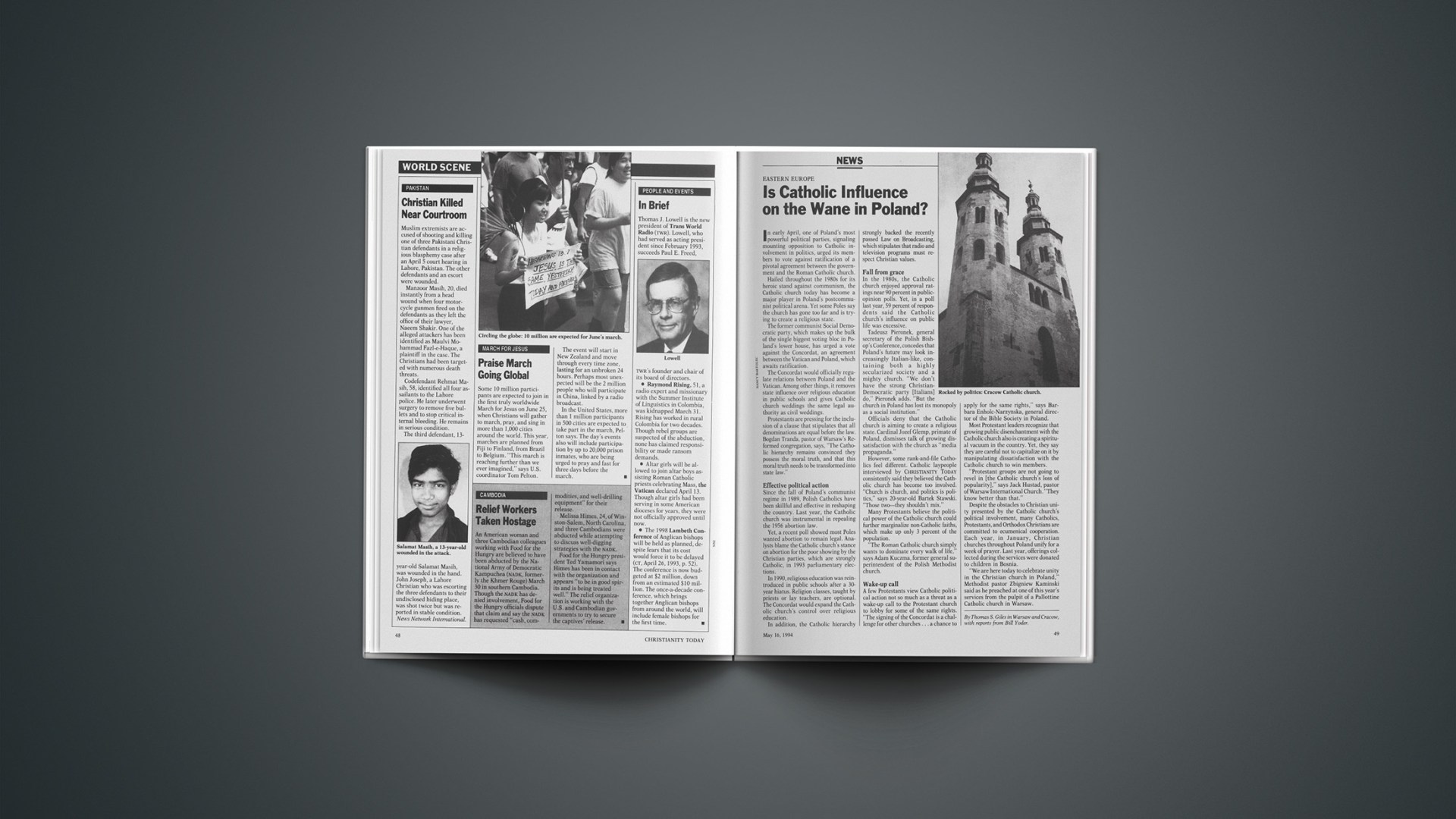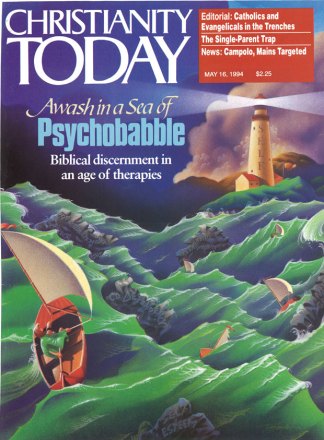In early April, one of Poland’s most powerful political parties, signaling mounting opposition to Catholic involvement in politics, urged its members to vote against ratification of a pivotal agreement between the government and the Roman Catholic church.
Hailed throughout the 1980s for its heroic stand against communism, the Catholic church today has become a major player in Poland’s postcommunist political arena. Yet some Poles say the church has gone too far and is trying to create a religious state.
The former communist Social Democratic party, which makes up the bulk of the single biggest voting bloc in Poland’s lower house, has urged a vote against the Concordat, an agreement between the Vatican and Poland, which awaits ratification.
The Concordat would officially regulate relations between Poland and the Vatican. Among other things, it removes state influence over religious education in public schools and gives Catholic church weddings the same legal authority as civil weddings.
Protestants are pressing for the inclusion of a clause that stipulates that all denominations are equal before the law. Bogdan Tranda, pastor of Warsaw’s Reformed congregation, says, “The Catholic hierarchy remains convinced they possess the moral truth, and that this moral truth needs to be transformed into state law.”
Effective political action
Since the fall of Poland’s communist regime in 1989, Polish Catholics have been skillful and effective in reshaping the country. Last year, the Catholic church was instrumental in repealing the 1956 abortion law.
Yet, a recent poll showed most Poles wanted abortion to remain legal. Analysts blame the Catholic church’s stance on abortion for the poor showing by the Christian parties, which are strongly Catholic, in 1993 parliamentary elections.
In 1990, religious education was reintroduced in public schools after a 30-year hiatus. Religion classes, taught by priests or lay teachers, are optional. The Concordat would expand the Catholic church’s control over religious education.
In addition, the Catholic hierarchy strongly backed the recently passed Law on Broadcasting, which stipulates that radio and television programs must respect Christian values.
Fall from grace
In the 1980s, the Catholic church enjoyed approval ratings near 90 percent in public-opinion polls. Yet, in a poll last year, 59 percent of respondents said the Catholic church’s influence on public life was excessive.
Tadeusz Pieronek, general secretary of the Polish Bishop’s Conference, concedes that Poland’s future may look increasingly Italian-like, containing both a highly secularized society and a mighty church. “We don’t have the strong Christian-Democratic party [Italians] do,” Pieronek adds. “But the church in Poland has lost its monopoly as a social institution.”
Officials deny that the Catholic church is aiming to create a religious state. Cardinal Jozef Glemp, primate of Poland, dismisses talk of growing dissatisfaction with the church as “media propaganda.”
However, some rank-and-file Catholics feel different. Catholic laypeople interviewed by CHRISTIANITY TODAY consistently said they believed the Catholic church has become too involved. “Church is church, and politics is politics,” says 20-year-old Bartek Stawski. “Those two—they shouldn’t mix.”
Many Protestants believe the political power of the Catholic church could further marginalize non-Catholic faiths, which make up only 3 percent of the population.
“The Roman Catholic church simply wants to dominate every walk of life,” says Adam Kuczma, former general superintendent of the Polish Methodist church.
Wake-up call
A few Protestants view Catholic political action not so much as a threat as a wake-up call to the Protestant church to lobby for some of the same rights. “The signing of the Concordat is a challenge for other churches … a chance to apply for the same rights,” says Barbara Enholc-Narzynska, general director of the Bible Society in Poland.
Most Protestant leaders recognize that growing public disenchantment with the Catholic church also is creating a spiritual vacuum in the country. Yet, they say they are careful not to capitalize on it by manipulating dissatisfaction with the Catholic church to win members.
“Protestant groups are not going to revel in [the Catholic church’s loss of popularity],” says Jack Hustad, pastor of Warsaw International Church. “They know better than that.”
Despite the obstacles to Christian unity presented by the Catholic church’s political involvement, many Catholics, Protestants, and Orthodox Christians are committed to ecumenical cooperation. Each year, in January, Christian churches throughout Poland unify for a week of prayer. Last year, offerings collected during the services were donated to children in Bosnia.
“We are here today to celebrate unity in the Christian church in Poland,” Methodist pastor Zbigniew Kaminski said as he preached at one of this year’s services from the pulpit of a Pallottine Catholic church in Warsaw
By Thomas S. Gilles in Warsaw and Cracow, with reports from Bill Yoder.










